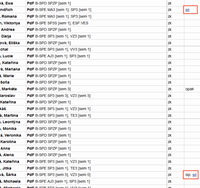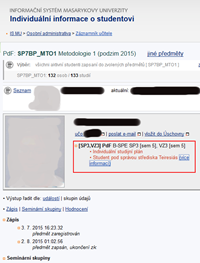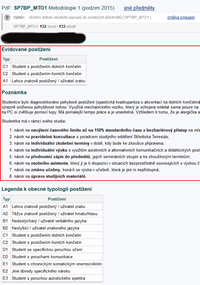Information for teachers
Information contained in this website relates to Masaryk University teachers whose classes are attended by students with special needs that entitle them to apply for recognition of specific requirements (according to MU Directive No. 8/2014 and 9/2014), and/or a customized study plan. These students and their teachers may benefit, to a different extent, from special services provided by the Teiresias Support Centre; the main principles and terms are stated bellow. We kindly request teachers to carefully check details of these terms. Please do not hesitate to contact us for any enquiries you might have.
1. Who are special needs students?
- A special needs student is a member of academia who, upon a functional diagnosis, was acknowledged by the dean of the faculty to have right to benefit from a proportionate adjustment of the study environment, or from other specifically defined services.
- Students who had their “special needs” recognised (in compliance with the mentioned MU Directives), or their customized study plans drawn up can be discerned in the Information System by means of the following abbreviations – “sn” or “isp, sn”. This information also appears in the list of enrolled students, in individual information about the student as well as in the detailed preview of the impairment record. See the attached examples that were anonymized for this purpose.



2. Approaching students with special needs
- Students with special needs are members of the academia studying in accordance with the internal MU legislative documents. Special needs persons’ studies may differ in comparison with the studies of students “without special needs” in the technology employed for communication (e.g. using digital resources instead of physical documents in case of visually impaired students, using real-time online chat instead of verbal communication in case of hearing impaired students, etc.) and in duration of the studies. The content remains the same.
- Study requirements should, therefore, follow those stated in the course syllabus. There is no need to alter the form and manner of course completion or the principles applying to students’ assessment.
- As their studies might be more time demanding, students with disabilities may be allowed some extension of the time required to complete their studies, up to double in justified cases. Individual tuition of a subject should not exceed the double of standard study time.
- Those interested in the practicalities of communication with special needs students may peruse the available methodology guides (Communication with the Visually Impaired, Communication with the Deaf etc.) or contact us to schedule a personal appointment.
3. How do students with special needs work?
Work methods (communication in contact classes, work with text documents or graphics, etc.) vary greatly according to the type of impairment. Please note we mention only the basic principles with regard to each major group. You may contact the study counsellors for further information about sensory, physical, and technical possibilities of individual students.
Students with visual impairments
Students with visual impairments are usually not limited in terms of communication but tend to experience difficulties with texts or graphic documents. Most people with visual impairments use some sort of assistive technology such as manual or software magnification devices, screen reading systems (so called screen readers), refreshable braille display, or materials in special formats (electronic documents, tactile or magnified print, hybrid books).
It is thus convenient to use digital editable resources in all the above-mentioned cases. If you are planning to work with any kind of documents (presentation slides, printed materials, digital visual data, etc.), feel free to contact us. We are happy to be of assistance and help you with the material adaptation.
(Contact the Library)
Students with hearing impairments
Students with hearing impairments typically need more time to work with written documents. It is advisable to take this fact into consideration in case of tasks comprising written production, and test taking (see the section Adapting examinations). Students may use either the services of a sign language interpreter or a speech-to-text reporter in order to participate actively in communication or to follow contact classes.
(Contact the Interpreting and Speech-to-Text Service Coordinator)
Students with mobility impairments
Work habits may vary according to the degree and localization of the impairment. If your class is attended by a student with fine motor skills impairment, you may want to substitute physical materials with digital resources or, alternatively, make use of services of a speech-to-text reporter. Students with lower extremity impairment generally do not require any adaptation when their class takes place in a barrier-free classroom. If this is not the case, the student may attend individual classes.
Students with specific learning difficulties
Students with specific learning difficulties typically experience difficulties processing and producing texts. For this reason, you may want to consider some allowance of time extension with tasks that require active and more complex work with texts (open cloze exercises, written preparation for an oral exam, foreign language lessons, etc.). At the same time, it is convenient to let the students use markers or other stationary items which help them focus on the text. Students may be allowed to employ also (electronic) spelling and grammar checkers when composing their own texts, unless it is incompatible with the nature of the task.
(Contact the Psychological Counselling Department)
Students with psychological difficulties
Students with psychological difficulties may suffer from attention disorders, increased fatigue, panic attacks, communication difficulties, etc. For working, these students typically need a quiet, intimate environment and possibly a personalized approach.
(Contact the Psychological Counselling Department)
4. What are special needs students entitled to?
Study guidance
Individual tuition and consultations
Unless it is technically or physically feasible for the student to follow the content of the course with his or her classmates, individual tuition or consultations (either one-time or regular) can be arranged. The Teiresias Centre is able to provide appropriate study rooms and technical equipment (special software and hardware) as well as financial remuneration for extra tuition.
Individual examination, alteration/adaptation of examination date
Given the fact that students with special needs are allowed time extension in some types of examinations, and considering increased technical demands placed on arranging the examination date (e.g. students with visual, auditory or mobility impairments), the examination can be carried out in the Teiresias Centre. We can provide necessary technical equipment as well as adequate exam supervision. The teacher always remains fully in charge of the assessment.
Should there be a serious reason for the student not to attend regular examination dates, he or she is entitled to an individual examination date. The Teiresias Centre can arrange it upon agreement with the teacher. Exam materials might also need, in justified cases, some adjustment. This applies particularly to students with visual impairments whose exam materials should always be examined and, if needed, adapted. We kindly ask you for your cooperation regarding the test administration so that we can make sure the materials are ready for the set date.
The Study guidance is provided by the Teiresias Centre
Student Office.
Related information can be found in the
Studies section.
Contact the Studies section staff
here.
Library and information service
If your classes are attended by students whose impairment prevents them from following the standard course materials (e.g. students with fine motor skills disorders, visual or hearing impairments), feel free to contact the Teiresias Library and inquire about the material conversion. The Teiresias Library converts the required study materials into suitable formats according to the type of impairment (e-text, tactile print, video documents in sign language, etc.).
If you want your material converted, please let us know:
- the student’s personal university ID number (UČO),
- the name and code of the course,
- the bibliographic record of the material you wish to use,
- and, facultatively, the optimal delivery time.
All texts prepared by the Teiresias Centre are catalogued and archived in The University Library for Students with Special Needs at MU. The catalogue is available to the public; you can therefore check whether the requested publication has not been adapted. Unless the copyright holders have agreed otherwise, all digital copies are only accessible to registered members with relevant impairment (check the conditions of registration to the Library). The physical resources of the Library is open to the faculty and public outside MU in the service hours without restrictions.
The Library services are provided by the
Library and Publishing Section of the Teiresias Centre.
Related information can be found in the
Library and Publishing section.
Contact the Library and Publishing staff
here.
Interpreting and Speech-to-text Service
This is a service primarily aimed at providing communication during classes and related activities (e.g. examinations, consultation, practical training) with students with hearing impairments. Interpreting and speech-to-text reporting can be equally used by academic and non-academic staff in charge of these activities.
Therefore, a sign language interpreter, or a speech-to-text reporter, who ensure the accessibility of instruction, may be present in classes attended by a student with hearing impairments. The sign language interpreter’s name is mentioned in the course course in the IS. The speech-to-text report created during the class is meant to be of private and immediate use to the student alone and is not to be further shared. The teacher may authorize it additionally and it may serve as a standard study material.
The service is provided by the
Interpreting and Speech-to-Text Services at the
Visual Communication Section of the Teiresias Centre.
Contact the staff
here.
5. Where can i find help?
Study counsellors listed according to their faculty assignment
- Faculty of Education: Bc. Anna Kolářová
- Faculty of Science, Faculty of Medicine, Faculty of Education: Mgr. Ondřej Pelech
- Faculty of Informatics, Faculty of Economics and Administration, Faculty of Sports Studies: Mgr. Lukáš Másilko
- Faculty of Law: Mgr. Eva Hulíková
- Faculty of Arts: Mgr. Tomáš Varga
- Faculty of Social Studies: Mgr. Ilja Rajdová
Contact the staff
here.
Library and related services
- Study materials administration (digitization of materials, braille printing, tactile graphics): Mgr. Michaela Hanousková
Contact the staff
here.
Interpreting and Speech-to-Text Services Coordinator
- Mgr. Bc. Markéta McDonald
Contact the staff
here.
Psychological Counselling Section and Learning Difficulties Diagnosis
- Mgr. Andrea Lázničková, Mgr. Tereza Netolická
Contact the staff
here.
6. Related Legislation